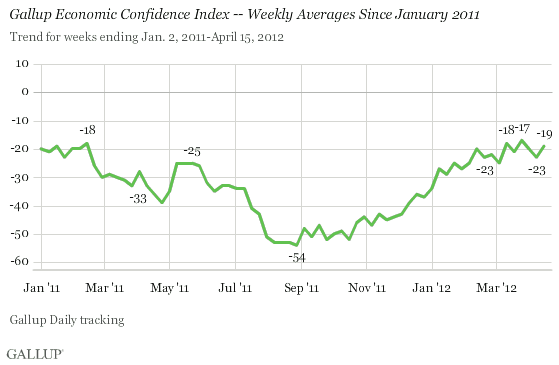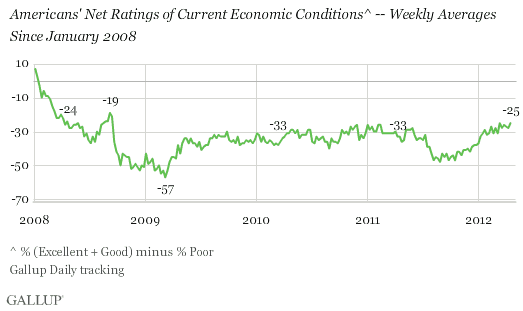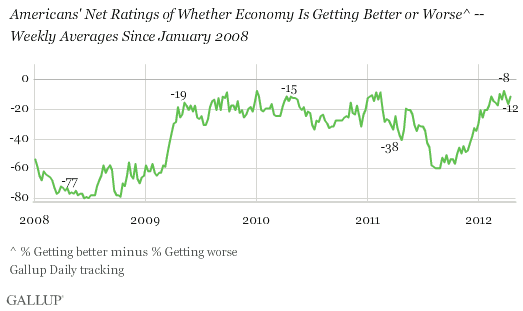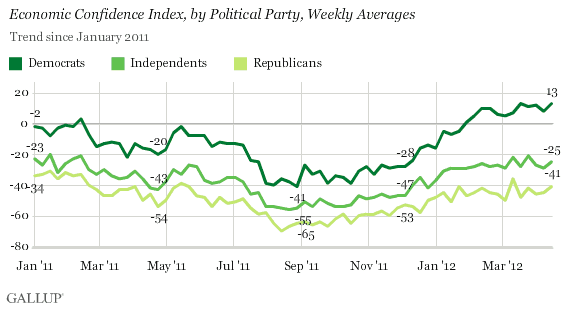PRINCETON, NJ -- Gallup's U.S. Economic Confidence Index regained positive momentum last week, after two consecutive weeks of slight declines. At -19, the index is now just two points below its four-year high, measured three weeks ago.

The current results are based on April 9-15 Gallup Daily tracking, including interviews with more than 3,000 U.S. adults. Gallup began Daily tracking of its Economic Confidence Index in 2008. Recent measures of confidence have been among the most positive Gallup has seen in that time span.
The index combines responses to two measures of the economy -- Americans' ratings of current economic conditions and their assessments of whether the economy is getting better or worse.
Fifteen percent of Americans now rate economic conditions as excellent or good, while 40% rate them as poor. That -25 net score is the least negative assessment Gallup has measured since September 2008.

Also, 42% of Americans say the economy is getting better and 54% say it is getting worse. The net -12 score for the economic outlook is a bit lower than the -8 of a few weeks ago, but still among the best Gallup has measured in the last four years.

Democrats Upbeat About Economy's Direction
Since late January, Democrats have consistently registered positive scores on Gallup's Economic Confidence Index. Their +13 score this past week matches their high during this period. Meanwhile, independents and Republicans continue to be more negative than positive about the economy.

Since the beginning of 2011, the parties' confidence ratings have generally moved in tandem, with Democrats the most confident and Republicans the least. All three groups are now showing improved confidence compared with the lows seen in August; however, since late last year, Democrats' confidence has been improving at a faster pace than that of independents or Republicans. Specifically, since early December, Democrats' index score has improved by 41 points, compared with a 22-point gain for independents and a 12-point gain for Republicans.
Democrats' strong scores are driven by their rosy economic outlook -- currently, 63% say the economy is getting better, compared with 33% who say it is getting worse. Democrats' net +30 outlook score compares with net scores of -19 for independents (38% better, 57% worse) and -47 for Republicans (24% better, 71% worse).
Democrats remain slightly more negative than positive about current economic conditions, with 22% rating them as excellent or good and 26% as poor.
Implications
In recent weeks, Americans have been as positive about the economy as they have at any point since the beginning of 2008, when the recession was underway. After a two-week detour, when confidence headed slightly downward, Americans' economic confidence appears to be improving again.
Last week's data included a three-day rolling average score of -13 for April 13-15, which ties for the highest three-day rating Gallup has measured since 2008.
The fact that optimism is improving is notable at a time of near-record-high gas prices and still high unemployment rates.
The improved economic optimism is being led by Democrats, but is also apparent among Republicans and independents. The widening party gap in confidence could be a function of the political calendar, with President Obama's re-election bid on tap in November in an election that most likely will be decided by the health of the economy.
Gallup.com reports results from these indexes in daily, weekly, and monthly averages and in Gallup.com stories. Complete trend data are always available to view and export in the following charts:
Daily: Employment, Economic Confidence, Job Creation, Consumer Spending
Weekly: Employment, Economic Confidence, Job Creation, Consumer Spending
Read more about Gallup's economic measures.
View our economic release schedule.
Survey Methods
Results are based on telephone interviews conducted as part of Gallup Daily tracking April 9-15, 2012, with a random sample of 3,378 adults, aged 18 and older, living in all 50 U.S. states and the District of Columbia.
For results based on the total sample of national adults, one can say with 95% confidence that the maximum margin of sampling error is ±2 percentage points.
Interviews are conducted with respondents on landline telephones and cellular phones, with interviews conducted in Spanish for respondents who are primarily Spanish-speaking. Each sample includes a minimum quota of 400 cell phone respondents and 600 landline respondents per 1,000 national adults, with additional minimum quotas among landline respondents by region. Landline telephone numbers are chosen at random among listed telephone numbers. Cell phone numbers are selected using random-digit-dial methods. Landline respondents are chosen at random within each household on the basis of which member had the most recent birthday.
Samples are weighted by gender, age, race, Hispanic ethnicity, education, region, adults in the household, and phone status (cell phone only/landline only/both, cell phone mostly, and having an unlisted landline number). Demographic weighting targets are based on the March 2011 Current Population Survey figures for the aged 18 and older non-institutionalized population living in U.S. telephone households. All reported margins of sampling error include the computed design effects for weighting and sample design.
The questions reported here were asked of a random half-sample of respondents each night on the Gallup Daily tracking survey.
In addition to sampling error, question wording and practical difficulties in conducting surveys can introduce error or bias into the findings of public opinion polls.
For more details on Gallup's polling methodology, visit www.gallup.com.
